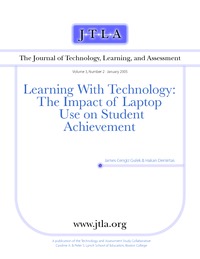 Diese Seite wurde seit 1 Jahr inhaltlich nicht mehr aktualisiert.
Unter Umständen ist sie nicht mehr aktuell.
Diese Seite wurde seit 1 Jahr inhaltlich nicht mehr aktualisiert.
Unter Umständen ist sie nicht mehr aktuell.
 Zusammenfassungen
Zusammenfassungen
The study presented in this article examines the impact of the Harvest Park Middle School’s laptop immersion program on student learning. Specific research questions include the following:
Von James Cengiz Gulek, Hakan Demirtas im Text Learning With Technology: The Impact of Laptop Use on Student Achievement (2005) - Does the laptop program have an impact on students’ grade point average?
- Does the laptop program have an impact on students’ end-ofcourse grades?
- Does the laptop program have an impact on students’ essay writing skills?
- Does the laptop program have an impact on students’ standardized test scores?
Rapid technological advances in the last decade have sparked educational practitioners’ interest in utilizing laptops as an instructional tool to improve student learning. There is substantial evidence that using technology as an instructional tool enhances student learning and educational outcomes. Past research suggests that compared to their nonlaptop counterparts, students in classrooms that provide all students with their own laptops spend more time involved in collaborative work, participate in more project-based instruction, produce writing of higher quality and greater length, gain increased access to information, improve research analysis skills, and spend more time doing homework on computers. Research has also shown that these students direct their own learning, report a greater reliance on active learning strategies, readily engage in problem solving and critical thinking, and consistently show deeper and more flexible uses of technology than students without individual laptops. The study presented here examined the impact of participation in a laptop program on student achievement. A total of 259 middle school students were followed via cohorts. The data collection measures included students’ overall cumulative grade point averages (GPAs), end-of-course grades, writing test scores, and state-mandated norm- and criterion-referenced standardized test scores. The baseline data for all measures showed that there was no statistically significant difference in English language arts, mathematics, writing, and overall grade point average achievement between laptop and non-laptop students prior to enrollment in the program. However, laptop students showed significantly higher achievement in nearly all measures after one year in the program. Cross-sectional analyses in Year 2 and Year 3 concurred with the results from the Year 1. Longitudinal analysis also proved to be an independent verification of the substantial impact of laptop use on student learning outcomes.
Von James Cengiz Gulek, Hakan Demirtas im Text Learning With Technology: The Impact of Laptop Use on Student Achievement (2005)  Dieser Text erwähnt ...
Dieser Text erwähnt ...
 Personen KB IB clear | Microsoft , S. Rockman | ||||||||||||||||||
 Begriffe KB IB clear | Ein Notebook pro StudentIn (ENpS)
,  Notebook Notebook laptop
, Notebooks an Schulennotebooks in schools
, One-to-One-ComputingOne-to-One-Computing laptop
, Notebooks an Schulennotebooks in schools
, One-to-One-ComputingOne-to-One-Computing
| ||||||||||||||||||
 Bücher |
|
 Tagcloud
Tagcloud
 Zitationsgraph
Zitationsgraph
 Zitationsgraph (Beta-Test mit vis.js)
Zitationsgraph (Beta-Test mit vis.js)
 8 Erwähnungen
8 Erwähnungen 
- Implementation and Effects Of One-to-One Computing Initiatives - A Research Synthesis (William R. Penuel) (2006)


- Ubiquitous Computing in K-12 Classrooms - A Systematic Review (Edward C. Bethel, Robert M. Bernard, Philip C. Abrami, Anne C. Wade) (2008)

- New Technology and Digital Worlds - Analyzing Evidence of Equity in Access, Use, and Outcomes (2010)


- Can One Latop Per Child Save The World's Poor? (Mark Warschauer, Morgan Ames) (2010)


- One Laptop per Child Birmingham - Case Study of a Radical Experiment (Mark Warschauer, Shelia R. Cotten, Morgan Ames) (2012)


- The Impact of a One-to-One Laptop Computer Program on the Literacy Achievement of Eighth-grade Students With Differing Measured Cognitive Skill Levels - Who are Eligible
and Not Eligible for Free or Reduced Price Lunch Program Participation (Eric G. Weber) (2012)


- Individuell fördern mit digitalen Medien - Chancen, Risiken, Erfolgsfaktoren (Bertelsmann Stiftung) (2015)
- Individuelle Förderung mit digitalen Medien. - Handlungsfelder für die systematische, lernförderliche Integration digitaler Medien in Schule und Unterricht (Richard Heinen, Michael Kerres) (2015)


- Individuelle Förderung mit digitalen Medien. - Handlungsfelder für die systematische, lernförderliche Integration digitaler Medien in Schule und Unterricht (Richard Heinen, Michael Kerres) (2015)
- One-to-One Computing and Student Achievement in Ohio High Schools (Nancy L. Williams, Karen H. Larwin) (2016)
 Volltext dieses Dokuments
Volltext dieses Dokuments
 |  Learning With Technology: The Impact of Laptop Use on Student Achievement: Artikel als Volltext ( Learning With Technology: The Impact of Laptop Use on Student Achievement: Artikel als Volltext ( : :  , 308 kByte; , 308 kByte;  : :  Link unterbrochen? Letzte Überprüfung: 2020-11-28 Letzte erfolgreiche Überprüfung: 2019-02-28) Link unterbrochen? Letzte Überprüfung: 2020-11-28 Letzte erfolgreiche Überprüfung: 2019-02-28) |
 Anderswo suchen
Anderswo suchen 
 Beat und dieser Text
Beat und dieser Text
Beat hat Dieser Text während seiner Zeit am Institut für Medien und Schule (IMS) ins Biblionetz aufgenommen. Beat besitzt kein physisches, aber ein digitales Exemplar. Eine digitale Version ist auf dem Internet verfügbar (s.o.). Aufgrund der wenigen Einträge im Biblionetz scheint er es nicht wirklich gelesen zu haben. Es gibt bisher auch nur wenige Objekte im Biblionetz, die dieses Werk zitieren.









 Biblionetz-History
Biblionetz-History